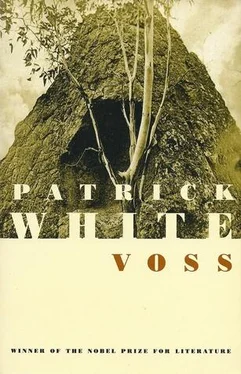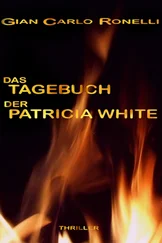Again he was the old, baggy man, and would ride on because it had become a habit. The flies were filling the red rims of his eyes. Only a faint future was visible through the dust.
‘Albert,’ called Turner, who was the weakest, and who, for that very reason, still admired his illusion of the strong, resourceful friend. ‘Do you see it?’
‘Do I see what?’
‘The water.’
‘Do I see the water!’
‘We must come to it.’
They rode in silence, listening to one another’s snuffling of dust and mucus.
Angus hated Turner now. Always a decent, passionless young fellow, endlessness had taught him to hate. So he hated Turner. He hated Judd also, but expressed that hatred differently. Since he had been forced by circumstances to put himself in the convict’s hands, open dislike could have reflected on his own judgement. Yet, he would continue to hate Judd, whether standing with him in the pits of hell, or recognizing the man from his phaeton as he drove down George Street after dinner.
‘Arr, Gawd,’ cried Turner, ‘I cannot go on! I cannot!’
‘Keep it to yourself, then,’ Angus advised. ‘We are all in the same condition.’
Turner’s nose began to whimper. He coughed and coughed, but emptily, and was retching dry.
Judd no longer paid much attention to his companions, since he was fortunate enough to be riding in advance of them.
So that the silence and isolation began to eat at Ralph Angus, until he wondered how he might ingratiate himself with his hateful leader, Judd. That the latter was also admirable made their relationship even more unfortunate. Already in childhood, the young man saw, he had been repelled by what he most admired. He remembered playing in his little frock in his godmother’s conservatory. Mists were descending, the fur of soft leaves was mingling with his cheeks, when he tripped and fell over a gardener’s wrinkled boots. The man at once bent down, and lifted him up, into the world of animal flowers. How frightened he was, and in love with the strong colours of the hairy throats. Suffocating scents drove against him, and the different smell of the gardener. The man’s hands were different, too, that could perform the strangest miracles. Then he had buried his own blenching, ineffectual nails in the different skin, and fought the man’s laughter. The heads of spotted flowers were reeling.
Yet, the servant had remained superior in his strength and easy temper, and when the child had been returned to the ground, and run away upon his fastest wheels, he had wondered which of his possessions to bring and put in the man’s hands.
So, now, the young grazier knew that he must ingratiate himself also with the hateful, the unfeeling, worst of all, the superior Judd, whose back it was ahead.
‘Judd!’ he called, lifting up his voice from the depths where it lay. ‘Judd, I have a suggestion to make.’
Judd neither answered, nor turned, although it was evident that he was waiting to receive.
Angus rode, or forced his horse almost level with the man who had become his leader.
‘Let us open the veins of one of these horses that are almost done. And wet our lips. Would it not be an idea?’
Judd did not answer.
Angus felt relieved that he was not quite level with the convict, and could fall back, bumping on his iron saddle, he who had once been a fine figure on a horse. In his mouth he could taste the clotting of disgust.
But, now that he rode alone again, the young man could have cried for the distance that separated him from Judd.
As they were approaching an outcrop of rock, an event in time such as these relics of human life seldom experienced now, Turner, who was in the rear, felt that a great weight had begun to drag him down. Magnificently, cruelly salient rocks, glassy-sharp, he knew he was not intended to reach them. So he threw up his sticks of hands, and was falling, falling. Nothing could have stayed him, except, perhaps, a suspension of personal destiny. Even so, when he struck the ground, which he did very lightly, on account of his poor condition — no umbrella, in fact, could have landed lighter — he set up a wildly importunate shrieking.
‘Save me, you beggars!’ Turner shrieked. ‘You devils! You are not leaving me to die?’
His bowels were protesting at the last injustice humanity would inflict upon him. Then he lay, spread out, a thing of dried putrescence and the scars of boils. His skin was grinning.
The rocks now became a most desirable goal for the two survivors, though what they would achieve by satisfaction of that desire was not at all clear. With terrible slowness, the horses approached their destination. The riders’ breath rose in a stench of almost mystical intensity. There was some possibility, of course, that Judd might open the cupboard of the rock, and step inside, to find himself at last. But Ralph Angus was haunted by a fear that he might not know how to die, when it came to the moment, in a manner befitting a gentleman.
Naturally he could not expect reassurance or advice from the convict on such a matter. Moreover, they were already treading upon the outer defences of the citadel, where the young landowner’s horse stumbled, and he half jumped free, half was flung out of the saddle, to slide down the infernal incline of the first molten pyramid. Arrived at its base, he lay, and when he had recovered sufficiently, which he was allowed to do, began to knock his head against the soothing rock. So the great gong boomed in his ear and Ralph Angus died, as young ladies of his own class offered him tea out of Worcester cups. Deliciously their fingers of rose and lilac braided him up in their possessive hair. They smothered him, and mothered him, until, at the last, he was presented as a swaddled baby. In this, his beard could have caused doubts, but he had parted from it: there it was, sprouting from the sand, independently, like a plant.
Judd now occupied the desert.
If the convict was taking longer to die, it was because of his great physical resources, and because he was determined to find some shade.
After slithering from the back of his horse, tearing his papery hands on several buckles, he had begun to shamble round the rocks. On this incalculable journey, which he was accomplishing in the manner of a surprised orang-outang, looking, and swaying, blinded by fatigue and mica, he was mumbling continually:
‘A little piece of shade. A little piece of shade.’
Stumbling.
‘Oh, Lord,’ he sighed.
He did not pause to consider whether his companions were already dead, let alone ponder over their way of dying, because death is such an absorbing matter; his mind could only contend with his own. That he would die now, he was fairly confident. Nor was he afraid at the prospect. It seemed the only right end to his plain, practical life.
If only God would take him at once into His rocky bosom. He did earnestly pray for this, who had in his time seen animals lie squirming, and men too.
Miraculously, he had found a little shade, very thin, against his own monument, and when he had got down, into the shadow of the rock, making himself as acceptable as he could, then he ventured:
‘If it is your will, Lord, let me die now.’
Two horses still stood drooping in the sun as the man lay beneath his eyelids, but horses, he remembered, could take a long time, then go off with very little fuss.
*
All night long the hoofs of horses were stumbling back and forth.
In the early hours, while a moon still lay upon the muddy surface of the waterhole, Colonel Hebden awoke, breaking a particularly horrible dream, of which he could not remember the details. Since he had decided to abandon his mission, it was only natural that he should await somewhat anxiously the approach of daylight, and with it the opportunity to inform his companions of his intention. The morning finally came, and it was with obvious relief and delight that the members of the expedition found they were of one mind. To none had it occurred that others might have been harbouring the same secret thoughts. So that animal spirits were let loose, and there was much laughter and joking as these hitherto solitary individuals emerged from their isolation, to make plans for a hopeful future, while consuming their normal breakfast of muddy tea, dusty damper, and splintery strips of dried beef.
Читать дальше












